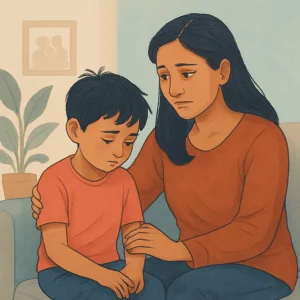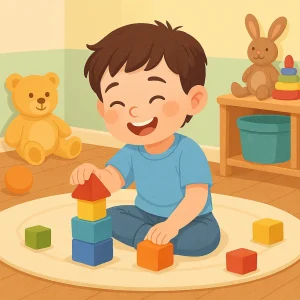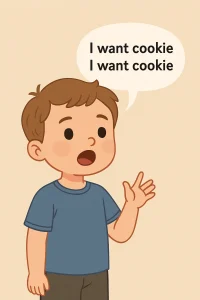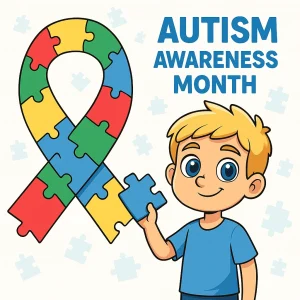Understanding Echolalia: 10 Key Differences in Speech Disorders
By Wellness Hub
Last Updated: April 11, 2025
Speech disorders encompass a wide range of communication difficulties affecting countless individuals across all ages. Among these, echolalia and speech disorder are often closely linked, especially in children showing signs of delayed or repetitive speech. Echolalia stands out not just for its unique characteristics but also for its frequent association with conditions such as autism spectrum disorder. Characterized by the automatic repetition of phrases or sounds, echolalia can act as both a communication barrier and a potential window into the cognitive world of those who exhibit it.
Understanding Echolalia
Echolalia may sound like a complex term, but it refers to a behavior most of us have witnessed either in children around us or depicted in various media. It’s when an individual repeats or “echoes” phrases or words they hear instead of responding with original language. It’s like a parrot effect but in humans, and it serves various roles in communication, especially in those with developmental delays or neurological conditions.
What is Echolalia?
Echolalia is typically classified into two types: immediate and delayed. Immediate echolalia occurs when a person repeats something they have just heard. For example, if you ask, “Do you want some juice?” they might respond by repeating, “Do you want some juice?” rather than simply saying “yes” or “no.” Delayed echolalia involves repeating something heard at an earlier time, often out of context. For instance, a child might say “Time for lunch!” because they heard it days ago when it was lunchtime, even though it might be bedtime.
This phenomenon is not just about mimicry; it often serves as a bridge to communication for those who struggle with traditional language skills. People with echolalia might use phrases they’ve memorized as a way to participate in conversations, express their needs, or even self-soothe in times of stress.
Also read: What is Echolalia? Why Some Autistic Children Repeat Words
Causes of Echolalia
Understanding why echolalia occurs is crucial for addressing it effectively. The causes are often rooted deeply in neurological and developmental factors. For many, echolalia is part of normal language development. Toddlers often repeat sounds and words as they learn to speak. However, persistent echolalia at an older age can indicate underlying conditions such as autism spectrum disorder (ASD), where it is seen as a characteristic behavior due to differences in how the brain processes language.
Other causes include Tourette syndrome and certain kinds of brain injuries or neurological disorders. In these cases, echolalia might appear suddenly and can be accompanied by other changes in cognitive or physical abilities.
Know more about 12 Causes of Echolalia in Kids Every Parent Should Know
Echolalia vs Other Speech Disorders
In exploring the landscape of echolalia and speech disorder, it becomes apparent that echolalia, while distinct, shares intersections with other communication challenges. Understanding these distinctions can greatly enhance our approach to diagnosis and therapy—particularly in settings like Wellness Hub, where personalized, evidence-based treatment is paramount.
Echolalia and Autism vs. Speech Delay
Echolalia is frequently observed in children with autism spectrum disorder (ASD), serving as a notable symptom due to the unique ways in which autistic individuals process language and social cues. In the context of echolalia and speech disorder, it might be used functionally—such as a method to maintain conversation or express needs—despite challenges in initiating spontaneous speech.
Contrast this with speech delay, where children typically show an overall slow development in the ability to form words and sentences, understand others, or express themselves verbally. Speech delays do not necessarily include the repetitive or mimicking aspects of echolalia but are characterized by a general lag in the acquisition of language skills.
Echolalia vs. Apraxia of Speech
Apraxia of speech is a motor speech disorder where the issue lies in the brain’s inability to plan and coordinate the muscle movements necessary for speech. Individuals with apraxia struggle to say what they want correctly and consistently, even though they know what they want to say. When comparing echolalia and speech disorder types like apraxia, it’s clear that apraxia is more about the execution of speech rather than the desire or cognitive ability to speak.
In contrast, echolalia involves repeating heard phrases correctly and fluently, indicating that the motor pathways for speech are intact. However, the repetition may not be contextually appropriate, highlighting a difference in understanding or processing the language rather than producing it.
Echolalia vs. Dysarthria
Dysarthria, unlike echolalia, arises from neurological impairments that cause weak or uncoordinated speech muscles. Those with dysarthria often have slurred, slow, or mumbled speech which is hard to understand—not because they repeat phrases but because their muscles cannot produce clear speech.
Echolalia’s repetition does not stem from muscle control issues but rather from neurological and psychological patterns affecting language processing. Thus, while both disorders affect speech, the clarity and nature of the speech are markedly different.
Read more: Understanding Dysarthria: Symptoms, Causes and Care
Language Disorders and Echolalia
Exploring the broader spectrum of language disorders, we differentiate echolalia from conditions such as expressive and receptive language disorders. These disorders involve difficulties in forming words and sentences to express thoughts (expressive) or trouble understanding spoken language (receptive).
Echolalia stands apart because individuals may perfectly echo complex phrases without necessarily understanding their content or being able to generate their own sentences. This distinction is crucial for therapists at Wellness Hub, as it guides the development of targeted interventions that focus on enhancing comprehension and spontaneous language use, beyond mere repetition.
10 Key Differences Between Echolalia and Other Speech Disorders
When it comes to understanding echolalia and speech disorder, distinguishing between the various types can significantly enhance our approach to diagnosis and therapy. Echolalia, a unique speech phenomenon, exhibits several key differences compared to other speech disorders. Here at Wellness Hub, we are dedicated to providing insightful, personalized care that addresses these nuances. Let’s explore the ten key differences that set echolalia apart from other speech challenges.
1. Speech Repetition vs. Variety:
Unlike the varied speech patterns seen in typical language development or other speech disorders, echolalia is characterized by the repeated utterance of phrases or sounds. This repetition is often exact and can be a direct mimic of previously heard speech, lacking the spontaneous variation that others may display.
2. Trigger Dependence:
Echolalia often occurs in response to specific triggers—sounds or words that prompt an echolalic response. This is less common in other speech disorders, where speech disruptions aren’t typically triggered by external stimuli but are inherent to the speech process itself.
3. Communication Intent:
One of the more profound differences is in communication intent. In many cases, echolalia lacks the communicative intent found in other disorders; the repetitions may not be meant to convey meaning or engage in typical conversational exchanges.
4. Associated Conditions:
Frequently linked with autism spectrum disorders, echolalia is often part of a broader set of behavioral and developmental characteristics. This association is distinct from many speech disorders, which can arise from a variety of causes including neurological damage, genetic conditions, or developmental anomalies unrelated to autism.
5. Developmental Patterns:
The development trajectory of echolalia is often linked to specific cognitive and developmental stages, particularly in children. It might initially appear as part of normal language development but becomes marked as echolalic when it persists beyond the typical age for such repetitions to cease.
6. Social Interaction:
Echolalia can impact social interactions uniquely by causing misunderstandings or inappropriate responses. This can disrupt the flow of conversation and lead to social isolation, unlike other speech disorders that may simply hinder clarity but still allow for engagement with intent.
7. Response to Therapy:
Targeted interventions for echolalia often focus specifically on reducing repetition and encouraging more meaningful, spontaneous language use. This is a more focused therapeutic goal compared to the broader approaches used in treating other speech disorders, which may include a wide range of speech-enhancing techniques.
8. Cognitive Load:
Individuals with echolalia often show less cognitive processing involved in their speech patterns compared to those with disorders impacting speech production or understanding, where the cognitive effort to form words and sentences is significant and challenging.
9. Awareness and Self-correction:
A notable aspect of echolalia is the limited awareness of one’s repetitive speech. Unlike some other speech disorders, individuals with echolalia may not recognize the need for or be capable of self-correction, often continuing to echo phrases without modification.
10. Functional Impact:
The functional impact of echolalia can often be more limiting in social contexts, restricting effective communication more significantly than other disorders that may affect speech clarity or fluency but still allow for some level of interactive engagement.
Conclusion
Echolalia is quite distinct from other speech disorders, known for its repetitive speech and specific triggers. It often ties closely to conditions like autism, requiring specialized care. At Wellness Hub, we tailor our therapy to fit each individual’s needs, helping them achieve clearer communication. If you or a loved one are dealing with echolalia, don’t hesitate to seek professional help.
Book a free consultation to learn more about our personalized programs. Let’s work together to enhance communication, ensuring everyone’s voice is heard clearly and effectively.
Frequently Asked Questions:
1. What is echolalia in children?
Echolalia is when a child repeats phrases and words they’ve heard. It’s common in kids learning to talk, but can also be a sign of autism.
2. How can I tell if my child has echolalia?
Notice if your child often repeats words or phrases soon after hearing them, or uses memorized phrases out of context.
3. Is echolalia a sign of autism?
Yes, echolalia is often associated with autism. It’s one of the behaviors commonly observed in autistic children.
4. What is the difference between echolalia and normal language development?
Normal language development involves creating new words and sentences. Echolalia involves repeating heard phrases without creating new ones.
5. Can speech therapy help children with echolalia?
Absolutely! Speech therapy can provide strategies to reduce repetition and encourage more meaningful communication.
6. What are some common triggers for echolalia?
Echolalia can be triggered by emotions, particular sounds, or specific words that a child hears.
7. What should I do if my child shows signs of echolalia?
It’s helpful to consult a speech therapist who can assess your child and suggest effective communication strategies.
8. How does echolalia affect social interactions?
Echolalia can make it challenging for children to interact socially, as repeated phrases may not fit into normal conversations.
9. Are there different types of echolalia?
Yes, there are two types: immediate echolalia, where phrases are repeated right away, and delayed echolalia, where phrases are repeated after a time gap.
10. Where can I find resources to help my child with echolalia?
Check out Wellness Hub’s resources for speech disorders, which provide support and tools for managing conditions like echolalia.
About the Author:
Rajini Darugupally
M.Sc., Speech-Language Pathologist (9+ years of experience)
Rajini is a passionate and dedicated Speech-Language Pathologist with over 9+ years of experience, specializing in both developmental speech and language disorders in children and rehabilitation in adults. Driven by a desire to empower each individual to find their voice, Rajini brings a wealth of experience and a warm, genuine approach to therapy. Currently, at Wellness Hub, she thrives in a team environment that values innovation, compassion, and achieving results for their clients.
Book your Free Consultation Today
Parent/Caregiver Info:
Client’s Details:
* Error Message








